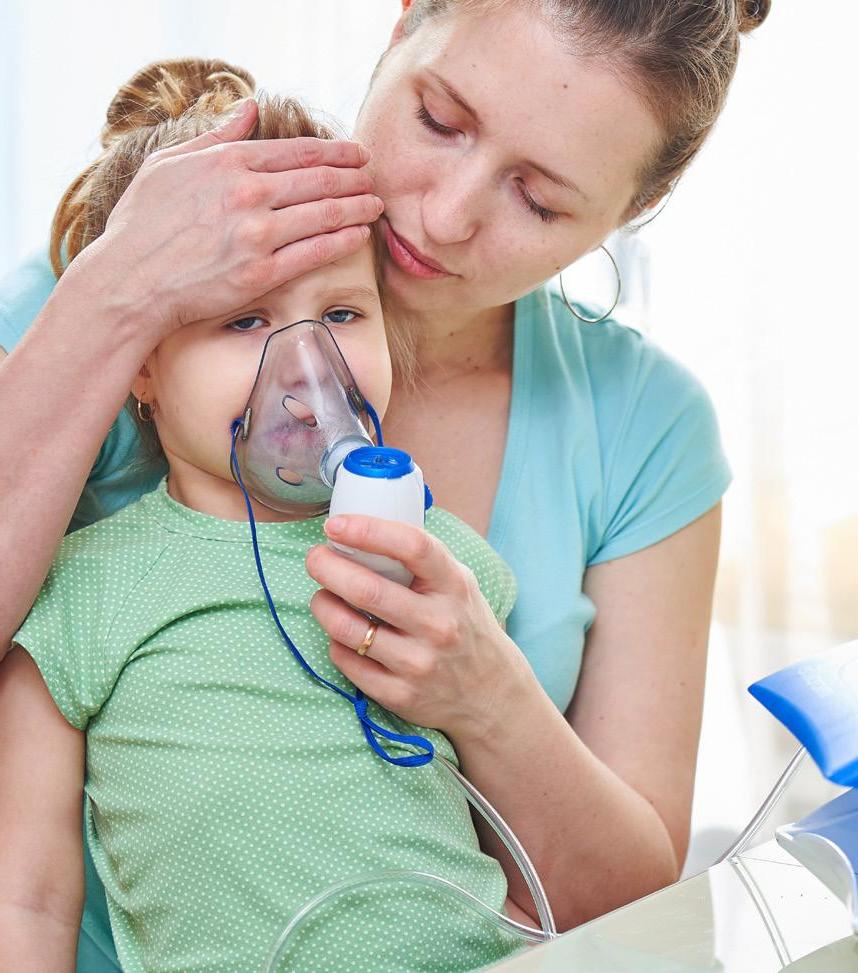
4 minute read
MORE THAN A BAD COUGH
BY NORA HESTON TARTE MORE Than a
BAD COUGH
THE 411 ON WHOOPING COUGH
Every year 50-200 California infants are hospitalized with pertussis—also commonly referred to as whooping cough— and while that number isn’t high, it is certainly too many. Peak pertussis numbers hit around 2012 with more than 48,000 cases of pertussis reported in the U.S., the highest number reported in more than 50 years. Case fatality rates are approximately 1 percent in infants younger than two months and less than 0.5 percent in infants two through eleven months of age.
Getting a vaccine can prevent whooping cough and is a huge part of the reason spread of the disease is typically low, despite being highly contagious. As long as people are vaccinated when they can be, whooping cough will not become an epidemic. Babies under two months of age are susceptible because they haven’t yet had the vaccine, however, maternal vaccination can help. “California Department of Public Health (CDPH) and the Centers for Disease Control and Prevention (CDC) recommend that expectant mothers receive the whooping cough booster shot (also called Tdap, or tetanus, diphtheria, and acellular pertussis vaccine) at the earliest opportunity between 27 and 36 weeks of every pregnancy, even if previously immunized,” says Mamta Jain, chair of the Department of Pediatrics at San Joaquin County Clinics. “Getting immunized during pregnancy boosts a mother’s immunity and passes on protective antibodies directly to their babies before birth. This helps protect newborns until they are old enough to begin receiving their own whooping cough immunizations at six to eight weeks of age.”
After the first vaccine is given at two months old (although it can be given as early as six weeks if needed), kids receive a booster in seventh grade and adults receive a whooping cough booster once in their lives unless otherwise requested and/or recommended.
So, there is a well thought out plan for limiting spread of whooping cough, but that doesn’t change the fact that some infants in California will still contract the disease. Part of the struggle is knowing when to seek care and when a cough is more than just a cough. The symptoms vary by age. Most children will experience a runny nose and cough that lasts one to two weeks. Then, the cough ramps up and children experience rapid coughing spells punctuated by a telltale whooping sound at the end. Infants, however, may never experience a cough. “Parents may describe episodes in which breathing briefly stops and the infant’s face turns red or purple,” Dr. Jain says. For older children and adults, the illness typically presents itself as a cough that lasts for several weeks It is likely to start with mild upper respiratory tract symptoms similar to common cold and progress to a cough with a “whooping” or gasping sound at the end. It’s common for vomiting to follow the cough, as well. Symptoms may take weeks or even months to sub-
“No baby should have to be hospitalized due to a vaccinepreventable disease, and certainly no baby should die,” Dr. Jain, San Joaquin County Clinics
side, with an average sick time of six to ten weeks. “Approximately half of adolescents with pertussis cough for 10 weeks or longer,” Dr. Jain says.
For many, whooping cough is an awful illness that they will recover from, but it can be dangerous especially for infants under six months of age. It is most dangerous in preterm and unimmunized infants.
The stats are scary. Sixty-seven percent of infants will experience gagging, gasping, and/or apnea when they have whooping cough. Sudden death is also possible in infants. Complications among infants include pneumonia, pulmonary hypertension, and complications related to severe coughing spells such as conjunctival bleeding, hernia, severe coughing spells leading to hypoxia, and complications such as seizures, encephalopathy, apnea, and death. “More than two-thirds of infants with pertussis are hospitalized,” Dr. Jain says.
Pertussis is highly contagious, as well, and even previously immunized people can contract the disease. This is in part due to how and when the vaccines are given. If you’re unsure, a test is available to check for the presence of antibodies in the bloodstream. If needed, additional boosters can be given. Limiting exposure to the general public as well as asking those who come in close contact with your baby to receive the booster, can help mitigate risk. You should also avoid people who are coughing, and if your child will be in daycare, ensure they have received the vaccine before enrollment.
PREVENTION
• Stay up to date on immunizations • Get a Tetanus Booster (Tdap) • Cover your cough • Wash your hands

CONSULT A DOCTOR:
SAN JOAQUIN COUNTY CLINICS
French Camp, Stockton, Manteca (209) 468-6820 SJCClinics.org SanJoaquinGeneral.org










